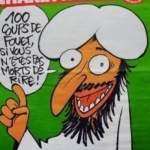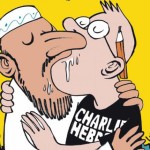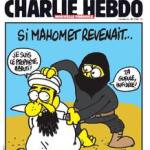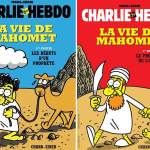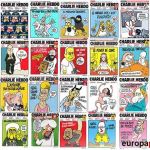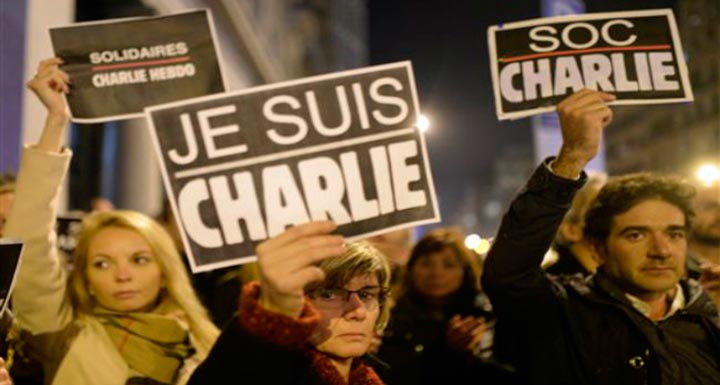
Trolls and Martyrdom: Je Ne Suis Pas Charlie
Shooting people is wrong.
I want to get this out of the way. When twelve people are killed by violence, whoever they are, for whatever reason, that is a tragedy and a waste. To murder someone by violence is the greatest crime imaginable—with the sole and narrow exception of using violence against people who directly and immediately threaten violence themselves.
There is no such thing as speech so hateful or offensive it somehow “justifies” or “legitimizes” the use of violence. The right to free expression—that’s a universal. The fear of violence should not determine what one does or does not say. In an ideal world that simply would not be a consideration because a violent reaction to speech would not be allowed to occur—in the imperfect world we live in, we should strive for the standard of knowing what we say might attract violence but speaking out as though the threat did not exist. That is the essence of the virtue we call “courage,” and the staff of Charlie Hebdo displayed it and should be honored for possessing it.
Okay, is that established? I am assuming this is basic common ground for everyone in this conversation, and anyone who disagrees should simply be excluded from it. (And deliberately dragging someone who does disagree into the conversation, as USA Today did, is at best counterproductive and at worst looks like the worst kind of clickbaiting.)
Because if we’re all agreed on that: Charlie Hebdo is also a crap publication and people need to stop celebrating it and making martyrs out of its staff.
The editors, writers, and cartoonists at Charlie Hebdo were human beings with families, friends, and loved ones. Their deaths should be mourned for that reason. But no more so than the Sodexo building maintenance man or the two cops who were also killed in the crossfire.
I join with those who call for grief at the deaths of twelve human beings—but I’m not down with mourning the work that Charlie Hebdo was doing or standing up and saying “Je Suis Charlie,” like what they did was a holy mission. If anything the work the two cops and the maintenance guy were doing deserves more respect and probably helped a lot more people.
Let’s be real about what Charlie Hebdo is. Calling it “journalism” isn’t quite right. Even the term “satirical newspaper” puts it on the same level as The Onion, which isn’t very fair to The Onion, which strives for at least some degree of cleverness and subtlety, most of the time.
Paging through translated cartoons from Charlie Hebdo’s past, the comparisons that kept coming to mind were to Mad magazine or pre-David Wong Cracked, but while the sophomoric level of humor fits—we’re talking single entendres on the level of this crappy joke about the Pope raping choirboys—none of those publications ever descended to quite the same depths as, say, making fun of the girls kidnapped by Boko Haram by portraying them as pregnant welfare queens.
The best comparison here for an American audience is, well, Internet stuff. The stuff that ends up in censored form on Tosh.0—the kind of videos, images, and text memes you see linked from 4chan or Something Awful. The most mainstream comparison is, I suppose, South Park, and it’s true that I got sick of Trey Parker and Matt Stone’s 2edgy4u schtick sometime around Team America: World Police. To be fair to them, South Park has only portrayed Muhammad a couple times, each time as part of a meta commentary on the politics of portraying Muhammad.
And the first time (the Cartoon Wars two-parter in 2006) the target of satire was just as much the cheap gag humor of rival show Family Guy as radical Islam, with Cartman’s epic rant:
“Do you have any idea what it’s like? Everywhere I go, ‘Hey Cartman, you must like Family Guy, right?’ ‘Hey, your sense of humor reminds me of Family Guy, Cartman.’ I am NOTHING like Family Guy! When I make jokes, they are inherent to a story! Deep, situational, and emotional jokes based on what is relevant and has a POINT! Not just one interchangeable joke after another!”
That’s a comment that could apply just as easily to Charlie Hebdo’s cartoons.
The political cartoon has been an art form devoid of much nuance or tact for some time, hence The Onion discovering that trying to parody the genre with deliberately bad cartoons produces cartoonsindistinguishable from the real thing. But this takes it to another level—the only “joke” with something like the “Boko Haram sex slave welfare” cartoon is the fact that they “went there.” We laugh because we’re shocked and titillated. It’s doing something just to prove you can get away with it.
Yes, I know that the editorial staff of Charlie Hebdo identify as left-libertarian atheists, and that they’re “equal-opportunity offenders” —the exact same background and mindset as Trey Parker and Matt Stone, as Seth MacFarlane, as your typical 4chan troll. I know that, ironically, the last issue printed before the shooting was mocking a self-serious right-wing racist doomsday prophet and his fear of a Muslim takeover, that they’ve mocked Socialist President Francois Hollande and National Front leader Marine La Penand everyone in between.
So what? There’s no particular merit to being an “equal-opportunity offender”—indeed, it’s lazy and cheap, a way to avoid being held accountable for anything you say because none of it is part of a moral worldview or to be taken seriously. (Something I’ve written about before and David Foster Wallace did much morefamously and eloquently.)
The whole reason the concept of responsible satire has been summed up as “punch up, don’t punch down” is to acknowledge that not all your targets of satire start out on an equal footing. Francois Hollande is not on the same level as girls who have been kidnapped into sexual slavery, and having the same “no-holds-barred” attitude toward them both is not the same as treating them fairly.
I mean, Muslims in France right now aren’t doing so great. The scars of the riots nine years ago are still fresh for many people, Muslims make up 60 to 70 percent of the prison population despite being less than 20 percent of the population overall, and France’s law against “religious symbols in public spaces” is specifically enforced to target Muslim women who choose to wear hijab—ironic considering we’re now touting Charlie Hebdo as a symbol of France’s staunch commitment to civil liberties.
Muslims in France are clearly worse off overall than, say, Jean Sarkozy (the son of former president Nicholas Sarkozy) and his wife Jessica Sebaoun-Darty, butCharlie Hebdo saw fit to apologize for an anti-Semitic caricature of Ms. Sebaoun-Darty and fire longtime cartoonist Siné over the incident while staunchly standing fast on their right to troll Muslims by showing Muhammad naked and bending over—which tells you something about the brand of satire they practice and, when push comes to shove, that they’d rather be aiming downward than upward.
I am not, in case I didn’t make it perfectly clear up top, saying the staff of Charlie Hebdo “asked for it” or “deserved” to get shot. The public discourse isn’t between people who think they “asked for it” and people who don’t—it’s entirely among people who agree that the violence was unacceptable, but some of whom feel that this obligates them to elevate Charlie Hebdo to heroes and to hold up “Je Suis Charlie” signs, and others who don’t.
Charlie Hebdo weren’t asking to be shot. They were asking for a reaction, though, and for half a century now they’ve been surviving pretty much on the notoriety of constantly trying to provoke a reaction. And let’s be real: pushing buttons, by itself, doesn’t make your work more virtuous. Pissing people off is just pissing people off.
Just like there’s no sense in which The Interview “justified” hacking Sony’s servers or “justified” threats of violence against moviegoers. But the reason The Interview, ultimately, wasn’t a movie worth seeing is the same reason that being able to see it became a big political statement—because there wasn’t much to the movie except trolling.
We have a problem where we feel like everything has to be boiled down into black-and-white “sides” and where the enemy of your enemy must be your friend—where in order to condemn the actions of horrible murderers we have to elevate their victims into sainthood. Hence fervent debate over whether or not Mike Brown stole five dollars’ worth of cigars, as though that has any bearing on whether or not it was okay to shoot him.
Well, it wasn’t okay to shoot Mike Brown even if he was a shoplifter. It wasn’t okay to threaten to shoot viewers of The Interview even if it was a crass, substance-free comedy designed to get PR by shaking a hornet’s nest from a safe perch across the Pacific Ocean.
And it definitely was not okay in the slightest to murder the staff of Charlie Hebdo, even if the publication that was their life’s work was a crappy low-tech dead-tree version of the obnoxious anti-religion memes on /r/atheism.
Why, some might be asking, am I being so harsh on their work so soon after they died? Why can’t I wait until the period of mourning has passed before pointing out that the blood of a martyr doesn’t make stupid, puerile, and, yes, racist work any less stupid, puerile and racist?
Well, it would be hypocritical to treat Charlie Hebdo with that degree of reverence when they themselves refused to do so for any of the targets of their satire. They’re only even called Charlie Hebdo as an inside joke after the original publication,Hara-Kiri Hebdo, got shut down for mocking former President Charles de Gaulleimmediately after his death.
More to the point, the Internet is already busy at work deifying Charlie Hebdo as the new Satanic Verses and Charb as the new Salman Rushdie. People are changing their profile photos to crude, racist caricatures of Middle Easterners in solidarity with the principle of “free speech” and the average person’s Twitter feed is one-half gleefully “irreverent” reposts of offensive cartoons and one-half cloyingly reverent tributes to said cartoons.
And any Middle Eastern or Muslim person who objects, even in the mildest possible terms, gets dogpiled for siding with the terrorists, natch.
Personally, I can’t just let that slide. You see, I’m from the Internet. Things move pretty fast here compared to the “old media” world that Charlie Hebdo occupied, and I’ve already seen what happens when you get a culture that, rather than asking to what end we defend free speech, valorizes free speech for its own sake and thus perversely values speech more the more pointlessly offensive it is—because only then can you prove how devoted you are to freedom by defending it.
When the only thing you’re reverent of is irreverence, when the only thing you hold sacred is the idea that nothing is sacred, well, you eventually get chan culture, you get one long continuous blast of pure offensiveness and taboo-breaking for taboo-breaking’s sake until all taboos are broken and there’s nothing left to say. You get people who shout racial slurs in unbroken succession all day and think they’ve accomplished something in the name of “free speech” by doing so.
Well, that’s their right in a free country. It may be fun and it may get them paid, until oversaturation ruins our sense for irony and destroys the market for it.
I wonder if the shooters knew that by killing the staff of Charlie Hebdo they would be enshrining them as immortal martyrs—and if they knew that by promoting a bunch of troll cartoons into the Western canon this way they’d be turning up the heat of Islamophobia in Europe, driving more and more people into their arms. I wonder if this whole media blitz of unconditional support for Charlie Hebdo and its “message” is exactly what the terrorists wanted, in the first place.
Now that’s another a level of irony indeed—all the more so because it’s a level of irony that escaped the cartoonists at Charlie Hebdo.
(From: The Daily Beast)

